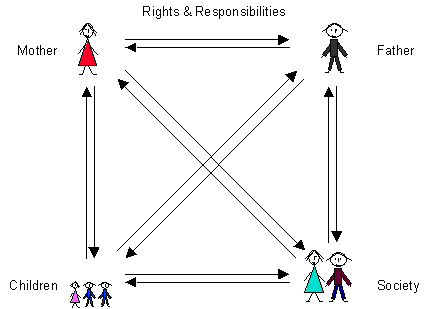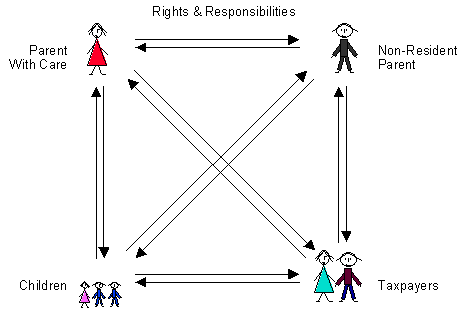Stakeholders in Child Support
There are lots of people who have a plausible stake in Child Support, but most of them take a narrow view of what they should take into account when making proposals.
This article identifies a way of taking a broader view. Failing to take a broad view is pretty certain to screw up lots of people and cause the proposals to have to be revisited later.
(I recently found that Chris Barton was using a similar stakeholder model before I developed this!)
The Social View
Early societies took quite an inclusive view of the responsibilities to bringing up children. The phrase "It takes a village to bring up a child" (apparently originating in Africa - big place!) indicated the magnitude of the the task of bringing up children.
"Western" societies have tended to emphasise the rights & responsibilities of individuals rather than societies. People ask "for what can I be held accountable in law?", and they can buy expensive lawyers to determine this. So "Western" societies have codified the rights & responsibilities of individuals to an increasing extent. It is no longer a matter of holding the village responsible - individuals want to know their own rights & responsibilities. Where children are concerned, here is a very simplified view of the network of rights & responsibilities of adults towards children. There are 4 sets of "stakeholders" (people involved in the processes) and all potentially have both rights & responsibilities towards all the others.
It is up to any particular society to decide which of these are relevant - this simply identifies the possible sets, not the necessary sets.
 |
This identifies the possible sets, and hence checklists to be taken into account, in a more or less intact family. But things tend to become significantly different once the family separates.
The Financial View
In a barter society, a person may build someone a cabinet in return for firewood for cooking. But what if the cabinet maker wants some firewood, plus some chickens, plus periodic transport to the next town? Suppose that building a cabinet provided X credits (where X was dependent on the skills of the cabinet maker & the time expended making a cabinet)? And these could be exchanged for X credits worth of anything else, based on the same principles? OK - now we've defined money! Up to a certain point, money is simply a complicated way of bartering. (It goes beyond that when it becomes possible to trade in money & derivatives of money - but that is another story, which can literally "break the bank").
"Western" societies have become so complex that they try to reduce everything to money. (Want a quote for loss of an arm? For emotional trauma?) So Child Support in separated families has largely been reduced to financial rights & responsibilities. This modifies the above model. (For descriptive purposes, PWCs appear to wear dresses, & NRPs tend to wear trousers. This is an over-simplification, but makes for simple narrative).
 |
This is incredibly simplified - where are the grandparents, step-parents, politicians, staff in the CSA, etc? But even with these simplifications, there are a large number of rights & responsibilities to be considered. 12 sets of rights, and 12 sets of responsibilities. And no one lobbying or making decisions appears to be considering more than a fraction of these. Child Support in the UK is being built on subsets of knowledge, not the whole story.
What are the rights & responsibilities?
The model simply shows the sets of rights and responsibilities that should be considered. It is a checklist which will often be used throughout the material here.
It doesn't say what those rights and responsibilities actually are or should be. They cannot be derived from scratch by science or by logic. They have to be chosen and evolved and legislated for by a society. Different societies will choose different ones. The reform of the UK's Child Support Agency is doing just this.
(Test - have you considered the responsibilities of a 15 year old child towards the non-resident parent? If not , why not?)
Here are some examples, some conventional, some a bit way-out.